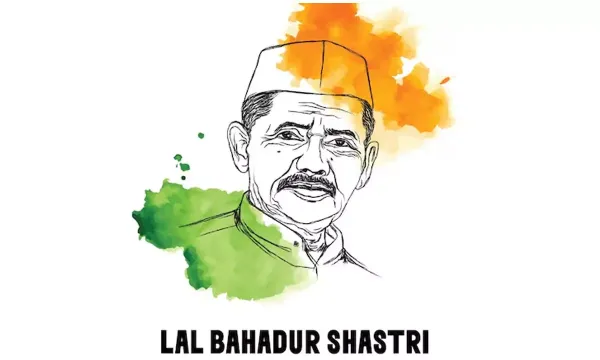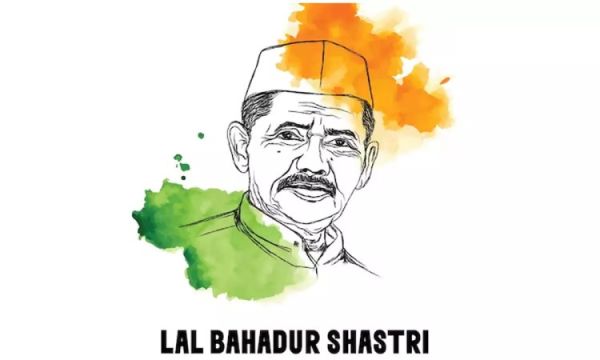
The second Prime Minister of India, Lal Bahadur Shastri, was a representation of humility, honesty, and morality. Generations to come are inspired by his legacy. Having been born in Mughalsarai, Uttar Pradesh, he was highly inspired by the non-violent and self-sufficient ideas of Mahatma Gandhi, with whom he shared a birthdate.

During the 1965 war with Pakistan, Shastri’s well-known catchphrase, Jai Jawan, Jai Kisan, which emphasized the value of both farmers and soldiers, came to represent national unity. From 1964 till his tragic death in 1966, he was Prime Minister of India.
A Life of Selflessness and Simplicity
Shastri had a straightforward existence. He encouraged Indians to voluntarily forego one meal a day in solidarity with the country during a food crisis. Following threats from the US to stop supplying wheat during the conflict between India and Pakistan, this request was made. His request for sacrifice was a reflection of his simplicity and altruism.
Shastri died on January 11, 1966, in Tashkent, yet his ideals and outlook for India are still applicable today. Let’s consider some fascinating details about his life and take inspiration from his words as we commemorate the anniversary of his birth.
Fascinating Details Regarding Lal Bahadur Shastri
• A Protest Against the Caste System: Shastri, whose birth name was Lal Bahadur Shrivastava, renounced his surname as a sign of his dedication to equality and against the caste system.
• Fondly Referred to as “Nanhe”: During his early years, his family nicknamed him Nanhe, which translates to “the little one.”
• Walking Barefoot to School: Shastri used to go barefoot to school, even in the sweltering summer heat, since she couldn’t afford slippers as a youngster.
• Joining the independence Struggle at 16: In response to Mahatma Gandhi’s appeal for the Non-Cooperation struggle, he joined the independence struggle at the age of 16.
• A Small Wedding: Shastri wed Mirzapur native Lalita Devi in 1927. The wedding was conducted according to tradition, but he accepted a spinning wheel and many yards of hand-spun fabric in lieu of a lavish dowry.
• Achieving the Title “Shastri”: Following his graduation from Kashi Vidyapeeth, where he studied philosophy and ethics, he was given the title “Shastri.”
• A Humble Loan for a Car: Shastri previously borrowed Rs 5,000 to buy a Fiat automobile. His widow used the family’s pension to pay back the debt after his death.
• Designating Women as Bus Conductors: In 1947, while serving as Minister of Police and Transportation, he took the historic decision—at the time an uncommon one—to designate women as bus conductors.
• Years Spent in Prison for the Nation: Shastri was a key figure in many campaigns against British rule during his roughly seven years in prison during India’s struggle for independence.
• Recipient of the Bharat Ratna: Shastri became the first person to receive India’s highest civilian distinction, the Bharat Ratna, posthumously in 1966.
Ten Motivational Sayings from Lal Bahadur Shastri
Regarding colonialism: “We would consider it our moral duty to lend all support to the abolition of colonialism and imperialism in order to allow people everywhere to freely shape their own destiny.”
2. On Unity in Diversity: “The diversity of our nation is what makes it special; we have Christians, Sikhs, Hindus, Muslims, Parsis, and adherents of every other religion.” There are churches, mosques, gurdwaras, and temples here. However, we stay away from politics and all of that stuff. This is how Pakistan and India vary from each other.
Regarding Establishing a Socialist Democracy: “Our path is unambiguous: constructing a socialist democracy domestically, ensuring universal liberty and prosperity, and upholding international harmony and camaraderie with all countries.”
4. Regarding Peaceful Development: “We hold the belief that peace and peaceful development are beneficial not only to ourselves but also to people worldwide.”
5. Regarding National Strength: “We can only gain respect from other countries if we have greatness within and can eradicate unemployment and poverty from our nation.”
6. Regarding Democracy: “Violent or dishonest methods can never lead to true democracy, or the swaraj of the masses.”
Regarding National Defense: “Soldiers are not the only ones tasked with preserving freedom. We need a strong country as a whole.
8. Regarding discipline and unity: “The nation’s true sources of strength are discipline and united action.”
9. Regarding Agriculture: “Agriculture has a very significant role in our national existence. It serves as the foundation of our economy.
10. Regarding Loyalty: “All other loyalties are subordinate to loyalty to the country.” Furthermore, because it cannot be gauged by what one gets, this allegiance is unwavering.
The ageless wisdom and patriotism of Lal Bahadur Shastri’s comments continue to ring true, serving as a reminder of the principles that ought to govern each person as well as the country. All continue to be inspired by his humility, tenacity, and vision of an independent, unified India.